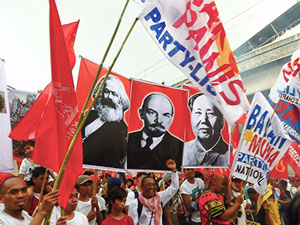MAY DAY ACTIONS
World’s workers demand jobs, higher pay
By
Kathy Durkin
Published May 9, 2012 9:24 PM
International Workers’ Day in major cities around the world had particular significance this year as many protests focused on the problems wrought by the global capitalist crisis — soaring unemployment, low wages and poverty. There were some signs of an anti-capitalist slant, and in some cities, even pro-socialist politics were on display. The Occupy movement joined actions in London, England; Toronto, Canada; and elsewhere.
|
Manila, Philippines
Photo: Ivan Phell T. Enrile
|
European socialists established this workers’ day in 1889 to honor the Chicago Haymarket martyrs, who fought for the eight-hour day. It became a global day for workers to set forth their demands and demonstrate their strength. Socialist countries, labor unions, socialists, communists and other progressive forces have commemorated it.
According to international news sources, hundreds of thousands of workers and activists marched in Europe. Labor unions decried layoffs and wage, pension and service cutbacks. Workers condemned the European Union, the International Monetary Fund and their own governments for imposing harsh austerity measures on millions of people.
Workers came out in Italian cities, including Turin, Rome and Rieti, and in 290 union-led actions throughout France. One million rallied in 80 Spanish cities, with the biggest assemblies in Barcelona and Madrid. They railed against Spain’s 50 percent jobless rate for youth and 25 percent for all workers. Rallies took place in Lisbon and all over Portugal, led by the CGTP union, which decried “exploitation and impoverishment” due to anti-labor attacks.
Banners held by workers, retirees and students proclaimed, “Revolt now!” and “Tax the Rich!” in Athens and other Greek cities, where severe austerity measures have devastated the masses. Some 400,000 workers attended 420 rallies throughout Germany to demand higher wages and an end to austerity policies in Europe.
Rallying in Asia, the Middle East, Africa
Across the globe, tens of thousands of Asian workers rallied for jobs and decent wages in Dhaka, Bangladesh; Colombo, Sri Lanka; Katmandu, Nepal; and Jakarta, Indonesia. In Dili, East Timor’s capital, 85 people were arrested as they demanded higher wages. Demonstrators in the Philippines burned an effigy of President Benigno Aquino.
The Hong Kong Federation of Trade Unions led a 5,000-strong demonstration for an eight-hour workday and higher wages. Women workers raised similar demands in Karachi, Pakistan. In Beirut, Lebanon, marchers carried signs bearing communist symbols.
In North Africa, echoes were heard of last year’s protests against U.S.-backed autocratic regimes. Tens of thousands marched in Tunisia’s capital, Tunis, while in Cairo, Egyptians denounced the repressive military regime. In Muqsha, Bahrain, unemployed workers demanded jobs they had punitively lost for joining the protest movement.
Jobs, wages and working conditions were also the focus of demands throughout Africa, including in Nigeria, where labor unions held actions in Lagos and Abuja. The Congress of South African Trade Unions organized 15 rallies across the country to honor workers’ contributions to the liberation struggle.
The Caribbean & Latin America
In Port-au-Prince, Haitian workers marched, chanting, “Minimum wage, 500 Gourds [$10]! Slavery — no! Workers — yes!” They demanded an official May Day and respect for their rights. Unions and other progressive forces, including the Mobilizing Collective to Compensate the Victims of Cholera, called the action.
Demands for economic justice were made throughout Latin America, including in Bogotá, Colombia, and Santiago, Chile, where police tried to suppress demonstrations. In contrast, thousands of Venezuelans enthusiastically marched in Caracas to support President Hugo Chávez’s new pro-labor law proposal.
Health care workers led the 500,000-strong march in Havana, Cuba, with its slogan, “To preserve and perfect socialism.” Nearly 2,000 guests represented unions and social movements from 117 countries. Demonstrations took place in Cuba’s 15 provinces, all demanding freedom for the Cuban 5 heroes unjustly held in U.S. prisons — Gerardo Hernández, Ramón Labañino, Fernando González, Antonio Guerrero and René González. Cubavision TV, which is available online in the U.S., broadcast Havana’s rally live.
G. Dunkel and Cheryl LaBash contributed to this article.
Articles copyright 1995-2012 Workers World.
Verbatim copying and distribution of this entire article is permitted in any medium without royalty provided this notice is preserved.
Workers World, 55 W. 17 St., NY, NY 10011
Email:
[email protected]
Subscribe
[email protected]
Support independent news
DONATE


